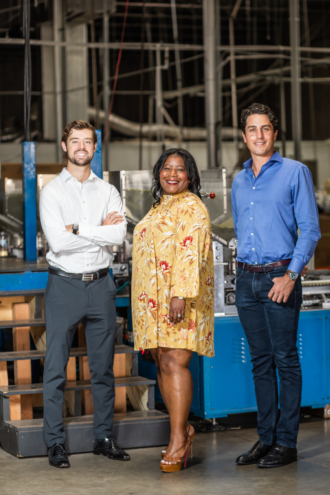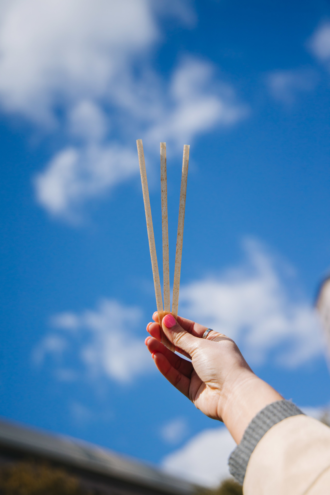[ad_1]
A frosty glass of water had a time bomb protruding from its rim: a paper straw. It did its job at first, but it surely solely took a number of sips for it to wither and disintegrate. And Sharina Perry wasn’t having that.
The previous web and cable government had, in 2018, based a wellness firm the place she used vegetation, like hemp, in topical and oral purposes. Now right here she was in an Oklahoma pub, fascinated about how her plant information might assist her develop a brand new straw, one which wouldn’t soften in liquid and nonetheless lower down on waste.
Perry invented a sturdy plant-based resin, a substitute for plastic, that may actually maintain its personal. Two years after that paper straw dissolved in her glass, the Dallas-based firm PlantSwitch, in partnership with Perry’s Utopia Plastix, is utilizing her invention to distribute an array of compostable meals packaging to eating places in North Texas and past. It very nicely could remodel the sector of compostable items.
Dillon Baxter and Maxime Blandin, two Southern Methodist College graduates and former golf teammates, have traveled to golf programs everywhere in the world. They likewise observed the development of paper straws of their drinks. And, like Perry, they hated it.
“Clearly we have been completely happy that they weren’t utilizing plastic,” says Baxter, however they questioned why there wasn’t one thing higher than a flimsy paper straw. Like numerous self-starters earlier than them, they resolved to seek out one thing higher. Final January they co-founded PlantSwitch to switch single-use plastics within the service trade, becoming a member of forces with Perry and her compostable innovation.
When Baxter and Blandin have been initially on the hunt for a superior product, a producer in Mexico tried to cross off Perry’s brainchild for their very own. When she examine PlantSwitch in an article, she had a hunch: “Once I noticed it, I spotted wherever they have been getting their product from had my materials.” She reached out to the fellows. “I instructed them who I used to be and the way broad our patent was,” she says. Perry defined these Mexico samples needed to have used her science. (Sure, she did sic her patent attorneys on the producer.)
“She’s the inventor of the resin, she’s the brains behind it,” says Baxter. “What she got here up with is fairly revolutionary and we predict it has the capability to switch plastic usually.”

Dillon Baxter (left) and Maxime Blandin of PlantSwitch with Sharina Perry (heart) of Utopia Plastix, inventor of a plant-based resin.
Courtesy PlantSwitch
Now, Baxter and Blandin take Perry’s expertise and distributes straws and utensils—quickly luggage and cups, too—to over 150 shoppers. Early adopters embody Dallas-based Vandelay Hospitality Group; restaurateur Julian Barsotti of Fachini, Carbone’s, Sprezza, and Nonna; Brady Wooden of Park Home and José; Shannon Wynne’s eating places like Rodeo Goat and the Meddlesome Moth; the brand new Thompson Resort in downtown Dallas; and lots of others each native and nationwide. Outdoors shoppers embody Pebble Seashore Golf Resort in California; the fellows bought their want, the product at a serious golf membership.
“The plan is to fairly quickly scale as much as finally serve among the largest chains within the nation,” says Baxter.
Blandin, a local of Martinique Island within the French Caribbean, had lengthy been cautious of plastics having seen the harm it will probably do to small island nations. Baxter, who hails from the verifiably land-locked Hill Nation city of New Braunfels, didn’t must witness plastic air pollution on an island to know the harm it does to the surroundings.
TAKEOUT AND DELIVERY HAS SKYROCKETED SINCE THE pandemic started. Final 12 months, a number of meals supply apps doubled their enterprise. Booze-delivery app Drzly noticed gross sales spike 300 p.c. Searches for “takeout” on the web site elevated ten-fold. And that’s simply tracked information. Loads of impartial eating places run on-line ordering independently whereas others maintain tight to the call-and-pickup technique. Carryout eating has helped legions of eateries survive these occasions. Nonetheless, that’s a number of trash.
Plastic air pollution is projected to extend by 40 p.c within the subsequent decade, in line with a report by the World Wildlife Fund. That makes attaining zero waste targets a lot trickier. Compostable kitchen and yard waste account for about 30 p.c of what’s despatched off to the town’s landfill. Single-use plastics are focused within the metropolis’s new Complete Local weather Motion Plan. In its effort to divert 35 p.c and 45 p.c in 2030 and 2040, respectively, the plan reads that “refusing and lowering imply saying no to disposables, avoiding single use plastics and packaging, and saying no to collaborating in unsustainable practices.”
By comparability, Houston and Fort Price had an estimated diversion price of 21 p.c in 2016, with Austin at 42 p.c.
Environmentalists hope single-use plastics—like cutlery and cups, or luggage that simply catch on tree branches—aren’t lengthy for this world. However it’ll probably take the push of personal trade to make adjustments.
“Laws is already shifting in that course,” says Baxter, who notes the U.S. is years behind Europe on sustainability practices. Texas is even additional behind. In 2018, the Texas Supreme Courtroom struck down a bag ban in Laredo after discovering it ran afoul of a state legislation that prohibited cities banning meals containers. The subsequent 12 months, the Legislature refused to revisit it. “Europe is each single 12 months pushing out increasingly more stringent biodegradability-compostability legal guidelines that restrict the usage of single-use plastic.”
The European Union is about to ban throw-away utensils, stirrers, and its ilk this 12 months. In America, too, cities similar to Boston, Boulder, New York, Los Angeles, Seattle, and San Francisco have bans or restrictions on plastic luggage. Baxter and Blandin suppose it’s solely a matter time that extra locations undertake related legal guidelines.
Till that occurs, although, company do-gooders and client will are behind ecological selections. “Granted, sure, any sustainable product goes to have the next price than petroleum-based merchandise. Petroleum is fairly low-cost. It’s onerous to beat that,” concedes Baxter, however he provides “research have proven clients desire to go to firms that make sustainable selections.”
There may be in fact a whole compostable bundle trade swelling with eco-friendly choices (nonetheless green-washed and loosely outlined “pleasant” is). Essentially the most prolific of which is a resin often called polylactic acid (PLA) that make up a number of compostable plastics.
A lot of what “you’re going to seek out available on the market have to be commercially composted” as a way to break down the fabric, says Baxter. “That in itself is utilizing power.” And not using a facility to compost them, PLA-based merchandise can take simply so long as common plastic to decompose in a landfill: about 450 years.
PlantSwitch merchandise naturally biodegrade in 180 days. Whereas PLA is an enchancment on typical plastics, it nonetheless sucks up treasured power. The crop Perry makes use of absorbs 4 to 5 occasions extra carbon than timber. PlantSwitch avoids creating environmental issues because it seeks to resolve one other.

And not using a facility to compost them, PLA-based merchandise can take simply so long as common plastic to decompose in a landfill: about 450 years. PlantSwitch merchandise naturally biodegrade in 180 days.
Courtesy PlantSwitch
EVER SINCE SHE WAS A LITTLE GIRL SHARINA PERRY dreamed in options. “As a younger woman, I might write out options—referred to as a utopia.”
Perry’s household has roots in Texas. Her grandparents moved from right here to New Mexico, the place Perry was born. “My grandfather couldn’t learn so after I was like seven or eight he would all the time have me learn his paperwork.”
He owned land in New Mexico and a recycling enterprise. “The scrap steel commerce enterprise, however we referred to as it junking.” Her father labored in oil and gasoline for Texaco. Even then, a breadcrumb path was routing Perry to her eventual work in composting—a type of recycling and a solution to petroleum. It appears preordained, in a approach, but it surely wasn’t a straight-forward journey.
Perry studied English and political science. She had a full profession in cable and web as a authorities contractor. She didn’t start researching totally different plant materials and its potential makes use of till it was a necessity.
A number of years in the past, her nephew, then 19 years previous, was identified with neurofibromatosis. The situation causes tumors to type all through the physique, notably within the mind, spinal twine, and nerves. “He was this vibrant younger boy, however [neurofibromatosis] modified the standard of his life,” says Perry. There isn’t a remedy and it will probably final a lifetime.
“My sister got here to me [when] he was having surgical procedure in Dallas and she or he stated, ‘It’s important to discover one thing to assist him.’” Perry dove into vegetation, creating pure merchandise that eased irritation. This led to the wellness arm of her rising firm, Utopia.
When her paper straw died a soggy demise in her cup of water, Perry aimed that very same problem-solving self-assuredness at a brand new goal.
“I’ve no diploma in chemistry,” she stated. “I made my first prototype of a paper straw in my kitchen simply believing I might use plant materials to do it.”
She started testing a hemp straw within the fall of 2018. She rapidly moved from her kitchen sink assessments to working with producer Hoffmaster to commercially produce straws utilizing her science. After a 12 months of tweaking and testing, she had a plant resin for her straw. By final February, she had a secure product able to go to market.
Perry’s patent attorneys have been impressed. “They have been like, ‘You set the large boys to disgrace with this one,’” she says.
When she was a toddler writing out options—utopias, she referred to as them—“I instructed my dad and mom I used to be going to vary the world by the point I used to be 50,” Perry says. “I’m 47 now.”
WITH GROWING FREQUENCY, TO-GO CONTAINERS and plastic-wrapped plastic forks are part of the way in which we eat. Takeout and supply have been rising earlier than COVID. Add to that curbside choices, the expansion of ghost kitchens, and fast-casual eating places superseding superb eating. The way in which we eat is altering. The very vessels carrying our meals might too, if PlantSwitch has any say about it.
When you consider composting, “your mind doesn’t naturally go to the demographic of Dallas, Texas,” says Baxter. “That’s not a knock on Dallas,” he assures, however the metropolis’s heat reception is “one of many issues that has shocked us.” Perhaps progress is occurring in spite of everything.
It’s okay to be skeptical about extra consumerism as the final word reply to tackling waste or huge unhealthy local weather change. A greener straw or a cup that can biodegrade if tossed into your yard in all probability gained’t save the planet. But it surely’s a begin.
These three would say it might even be the plant-based straw that breaks the camel’s again into an environmental awakening.
[ad_2]
Source link









